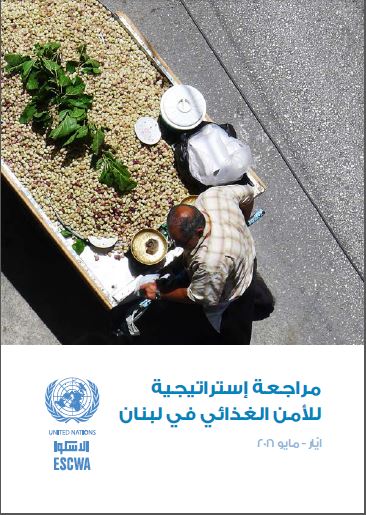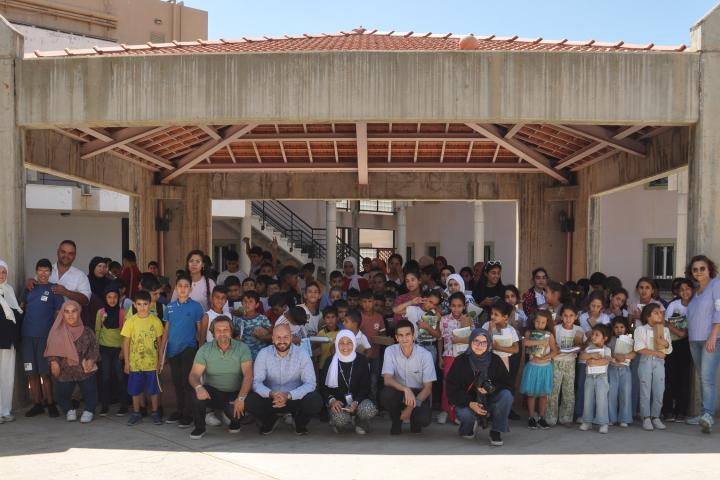(ESCWA/WFP) -- Lebanon needs to urgently formulate an integrated National Food and Nutrition Security Strategy to ward off rising food insecurity in the country, an ESCWA report says. The Word Food Programme (WFP) commissioned ESCWA to conduct a Strategic Review of Food and Nutrition Security in Lebanon, which has resulted intangible recommendations to improve food and nutrition security for all communities in the country.
“This report is a testament to the increasing need for joined forces at all levels to achieve the second United Nations Sustainable Development Goal in Lebanon: to end hunger, achieve food security, and improve nutrition and promote sustainable agriculture,” said Mohamed Moctar ElHacene, Director of the Economic Development and Integration Division at UNESCWA. “By producing the evidence base required to take action, the UN can facilitate actions that must take place at the policy and grassroots levels to protect Lebanon from deepening food and nutrition insecurity.”
The report analyses the availability, accessibility, utilization and stability of food consumption and production in Lebanon and provides comprehensive recommendations to support Lebanon achieve SDG 2, which aspires to “end hunger, achieve food security and improved nutrition and promote sustainable agriculture.” Among the report’s key findings is the need to reform food trade, market regulation and production responses to food and nutrition security in order to increase economic access to food.
“We hope that the findings and recommendations of this report will helpall actors to address critical issues affecting food and nutrition security in Lebanon, particularly in light of widespread food insecurity among refugees and rising food insecurity among Lebanese host communities,” said WFP Representative and Country Director, Dominik Heinrich. “In partnership with government actors as well as other national and international stakeholders, WFP will continue to expand its existing programmes, while maintaining emergency support to the most vulnerable populations in the country, be they residents or refugees.”
Even though Lebanon depends heavily on food imports, the country still produces a reasonably sufficient supply of nutritious food. Nonetheless, Lebanon’s agriculture sector has not reached its full potential, partially due to lack of land use planning and value chain development, both of which increase the country’s vulnerability to food price shocks.
The report found that Lebanese and refugee populations alike face food insecurity challenges. An alarming49 percent of Lebanese are reportedly worried about their ability to access enough food, and 31 percent of them stating that they were unable to eat healthy and nutritious food over the course of a year. In addition, overall increasing food prices and changes in dietary preferences lead to new challenges, including micronutrient deficiencies and increasing levels of obesity.
“A clear, comprehensive, multi-stakeholder “National Food Security and Nutrition Strategy” is only the first step towards resolving the issue of rising food and nutrition insecurity in the country,” said ESCWA. “The report plots a course for reform and, along with our partners in government and civil society, the UN can now work more diligently towards overcoming the challenge of eliminating hunger and providing food and nutrition security for all people living in Lebanon.”
Key findings from the report include:
• Up to 80 percent of the country’s food needs are imported in any given, thus making the country not only vulnerable to price shocks but also contributing to the high debt-to-GDP ratio.
• Despite fertile lands and relatively cheap labour, the contribution of the agricultural sector has reduced to 4 per cent.
• Different population groups are affected differently when it comes to availability and access to food, thus the report advocates for the review of labour market restrictions for refuges with a view towards improving their food and nutrition security. The Lebanese fare relatively better, though they are starting to show signs of widespread food and nutrition insecurity: due to lack of money and resources, 49 percent of Lebanese have reported being worried about their ability to source enough food, while 31 percent say they were unable to eat healthy and nutritious food over the course of a year.
• Partially due to the impact of the Syria Crisis and pre-crisis structural issues, social safety nets remain underdeveloped and the poverty rate in Lebanon remains at around 30 percent.
• Technological progress needs to be harnessed (e.g. improvement of irrigation) given water scarcity and low yield ratios.
• The change in dietary patterns towards less nutritious foodstuff increase health risks (e.g. obesity) and requires awareness reverse the trend.
Key recommendations from the report include, for example:
• Develop a strategic partnership to address food and nutrition security that involves international, national and local stakeholders
• Implement strategic actions including the formulation of a national food security and nutrition strategy, such as a national food security and nutrition strategy
• Identify priorities for agricultural investment and rural development
• Develop, implement and/or expand social safety nets to reduce vulnerabilities
• Raise awareness and promote healthy food and lifestyles
To consult the report:
https://www.unescwa.org/publications/food-nutrition-security-lebanon




